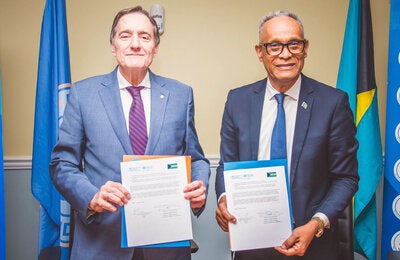

Experts working to expand the availability of HIV/AIDS treatment in Latin America and the Caribbean say that improvements are needed in the ways antiretroviral and other AIDS medicines are prescribed, monitored and managed to ensure they are widely and consistently available and that they retain their effectiveness against HIV-related illness.
Santo Domingo, Dominican Republic, 16 November 2011 (PAHO/WHO) — Experts working to expand the availability of HIV/AIDS treatment in Latin America and the Caribbean say that improvements are needed in the ways antiretroviral and other AIDS medicines are prescribed, monitored and managed to ensure they are widely and consistently available and that they retain their effectiveness against HIV-related illness.

The experts' assessment came at the end of a regional meeting on availability and management of HIV medicines and supplies organized by the Pan American Health Organization/World Health Organization (PAHO/WHO), the Global Fund to Fight AIDS, Tuberculosis and Malaria, and UNAIDS, held Nov. 9—11 in Santo Domingo.
Participants in the meeting included health officials from 14 countries of the Americas as well as representatives of the U.N. Development Program (UNDP), UNICEF, the U.S. Agency for International Development (USAID), civil society organizations, and others.
The meeting examined the obstacles to achieving universal HIV treatment for people who need it, including problems with access to quality supplies for diagnosis and treatment of HIV/AIDS, non-rational use of HIV/AIDS medicines, and the risk of shortages in medicines and supplies.
Among the conclusions reached after three days of discussions were the following:
Prescribing practices for HIV treatment in the region need to be reviewed and revised through an inclusive process led by ministries of health and with the participation of civil society, national experts, and scientific organizations.
The number of treatment regimens currently being used in the region should be reduced and should include only those that are demonstrably cost-effective and evidence-based.
New patients should be given treatment combinations provided as one pill per day.
Medicines that are no longer recommended because of toxicity or lack of efficacy should be phased out as soon as possible.
Systems for surveillance of patients under treatment should be improved.
Countries' abilities to project their needs for HIV-related medicines and supplies, including laboratory supplies and equipment, should be improved.
Participants also called for improvements in systems to collect and disseminate information on the availability and use of HIV/AIDS medicines and supplies, in particular to promote greater transparency and to provide early warning of potential drug shortages. A promising tool for this purpose, participants agreed, is the Regional Platform for Access and Innovation for Health Technologies, a series of Internet-tools currently being developed by PAHO/WHO to promote access, rational use, and good governance in the area of essential medicines and health technologies. A pilot project using the Regional Platform for Access and Innovation for Health Technologies is slated to begin in early 2012, with support from the Global Fund and other PAHO/WHO partners.
Participants called on PAHO/WHO to continue providing technical cooperation to help member countries strengthen their capacities for managing medicines and supplies at the local and national levels.
Links:
- Pan American Health Organization
- The Global Fund
- UNAIDS
- UNDP
- UNICEF
- USAID
- Regional Platform for Access and Innovation for Health Technologies
- PAHO technical cooperation on access and innovation
Contact:
Donna Eberwine-Villagran, eberwind@paho.org, Tel. +1 202 974 3122, Mobile +1 202 316 5469, Knowledge Management and Communication, OPS/OMS — www.paho.org



